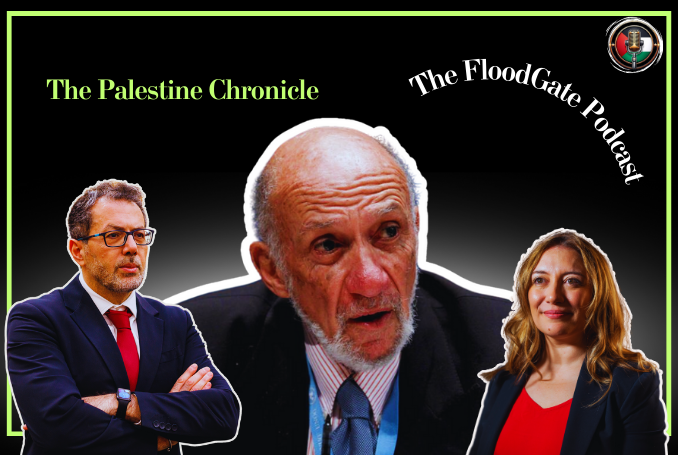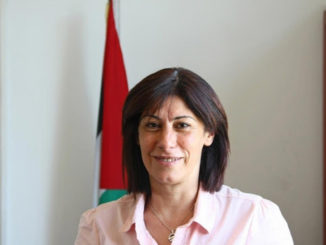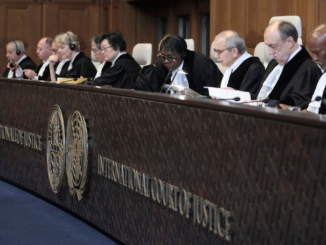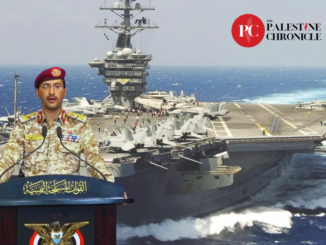
By Romana Rubeo 
Professor Richard Falk’s insights on international law, the Israeli-Palestinian conflict, and the failure of global institutions provide a compelling analysis in this FloodGate interview with Ramzy Baroud and Romana Rubeo.
In this unmissable episode of The FloodGate Podcast, Palestinian intellectual Ramzy Baroud and I interviewed Professor Richard Falk, a leading scholar in international law and former UN Special Rapporteur for Palestine.
Our discussion delved into the Israeli-Palestinian ‘conflict’, global power structures, and the failures of international governance.
Falk provided a sharp analysis of how international law has been manipulated to justify ongoing atrocities, the complicity of Western powers, and the structural flaws in global institutions that enable impunity.
He also explored the role of civil society in challenging these injustices and the importance of reclaiming historical narratives.
Below are the key takeaways from our conversation.
Complicity and the Israel Lobby in the US
Falk highlighted the overwhelming bipartisan support for Israel within the US political establishment, which leaves little room for meaningful governmental opposition.
“I do think the pressure on governments arising from the bipartisan character of Israeli support and by the one-sidedness of the US Congress makes it unlikely that there will be any kind of serious challenge from within the established order.”
Instead, he argued, the only real challenge comes from civil society, but that has triggered an unprecedented crackdown.
“There is a totally unconditional Israeli Zionist network of influential support that stands as the guardian of the status quo and will punish any political defect, any kind of political indication that there is a critical attitude toward the degree of support and the failure to react to this transparent ongoing cruel genocide. There’s no comparable pressure coming from the Palestinian side.”
The level of repression, he noted, is “quite unprecedented in American political experience, going back to at least the Vietnam War.”
Clash of Civilizations
Falk observed a deeper geopolitical alignment in how the so-called conflict is structured.
He described it as “a kind of second coming of Samuel Huntington’s Clash of Civilizations thesis,” where Western nations unconditionally back Israel while support for Palestine largely comes from the Islamic world.
“If you notice, all the complicity on the Israeli side comes from Western white liberal democracies, and all the support of a tangible character comes from Islamic-oriented groups in the region,” he said.
“So, you have this kind of civilizational alignment within which the alliance with Israel is just a piece in the larger puzzle.”
He emphasized that this makes it difficult to challenge Israel’s position without confronting the broader global order. “And that has, I think, an absence of political imagination, and typical politicians don’t even understand this wider setting of the conflict.”
The Enforcement Gap
The structural weaknesses of the United Nations were a major focus of the discussion. Falk explained that the UN was never meant to function as a true enforcer of international law.
“The UN was designed to be weak with respect to the enforcement of international law, particularly when geopolitical interests were engaged. There’s no other explanation for giving the five most dangerous countries in the world the legal authority to block the organization when it comes to decision-making and enforcement.”
This has created what he called an “enforcement gap,” where major powers can violate international law with impunity.
“The US role and to some extent the European former colonial powers’ role is to keep that enforcement gap widely in operation.”
He also identified two additional failures:
First, the complicity gap. “There’s rhetorical recognition of the relevance of complicity but there isn’t any real implementation of it, nor could there be any enforcement here also because even if you find the US and its partners complicit and treat that as a violation of the Genocide Convention, there would be no way to enforce that decision,” he said.
Second, the accountability gap: “Governments and individuals that violate international criminal law are supposed to be subject to some kind of punitive response, but that too is subject to this geopolitical veto.”
Falk summed up the reality of the UN system with a striking quote from a Mexican diplomat: “It holds the mice accountable while the tigers roam free.”
The Self-Defense Argument
Israel and its allies frequently invoke the principle of self-defense to justify their genocidal actions in Gaza, but Falk explained that this argument is legally flawed.
“The rationale of self-defense is one that even Israel and its supporters are not very comfortable pushing very hard with, because, as a matter of law, occupied Palestine is not a foreign state that one can invoke self-defense against.”
He emphasized that under international law, self-defense applies only to conflicts between sovereign states or in cases where an armed attack presents a sustained threat.
“You cannot consider the October 7th attack, which was an isolated incident, as justifying self-defense, which is supposed to only come into play in the event of an armed attack. This means a sustained use of force and a challenge to the overall security of the state.”
He pointed out that while the UN Charter recognizes the right to self-defense, Israel has manipulated this principle for political gain.
“Israel and its supporters have used the self-defense rationale opportunistically, and their real rationale is that Hamas and the Palestinians, in general, are terrorists and outside any legal protection, as Netanyahu and former Minister of Defense Gallant made clear from their immediate reactions. These people, or what they called ‘human animals,’ should be treated as such.”
Falk argued that this dehumanization effectively places Palestinians outside the framework of international law.
This pattern, he warned, reflects a deeper structural issue: “This notion is ecologically regressive and reveals a cruel, aggressive, exploitative pattern of behavior towards humans, even if animals were treated this way—it would still violate a basic moral framework.”
He highlighted the dangerous precedent that such rhetoric sets, noting that it aligns with historical cases of mass violence. “When leaders begin describing entire populations in subhuman terms, it’s a signal for large-scale atrocities. We’ve seen this before in history, and we know where it leads.”
UNMISSABLE: Do Palestinians Have the Right to Resist? w/ Richard Falk
In this unmissable, must-watch conversation, Professor Richard Falk—international law expert, former UN Special Rapporteur for Palestine, and leading scholar on global justice—breaks down the complexities of… pic.twitter.com/LbweGTnQPs
— The Palestine Chronicle (@PalestineChron) March 27, 2025
The Right of Resistance
While Israel and its allies reject Palestinian armed resistance as “terrorism”, Falk noted that international law explicitly recognizes the right of occupied peoples to resist colonial rule.
“The right of resistance was affirmed in the decolonization process in the 1980s and 1990s, and that right of resistance included the right of armed resistance. It subjected that resistance to compliance with the international law of war.”
He stressed that while violations of international law may occur within acts of resistance, the resistance itself is not inherently illegal.
“To the extent there is evidence of atrocities accompanying the October 7th attack, those would be violations. However, not the attack itself, which seems entirely justifiable and overdue in this context.”
Falk pointed to the way Western narratives have systematically erased the historical context of Palestinian resistance.
“One of the Western Israeli tactics has been to almost succeed in decontextualizing October 7th, so it would be seen as coming out of the blue.” This, he explained, is part of a broader effort to frame Palestinians as aggressors rather than as a people responding to decades of occupation and violence.
Even the slightest recognition of Palestinian grievances is met with fierce backlash, he noted.
“The UN Secretary-General, for even raising the obvious point that there had been a long prehistory of abuse of the Palestinian people, was defamed as an antisemite.”
The Gaza Tribunal
Frustration with the failures of formal institutions has led to grassroots initiatives like the Gaza Tribunal, which Falk sees as an effort to hold Israel accountable where governments have failed.
“I think the Gaza Tribunal definitely comes into being out of frustration with the formal normative order, especially with its failures to close the enforcement gap.”
“The reliance is on people when governments fail. It’s an effort to stimulate action by people designed to promote enforcement and stop the genocide from continuing,” he added.
Whether such initiatives will have a lasting impact is uncertain, but Falk noted that history shows they can be significant. “The ultimate impact of such initiatives is often more important after the process itself, but we have to wait and hope.”
The Need for Visionary Alternatives
Falk expressed deep concern about the absence of meaningful leadership in addressing global crises. “One of the deficiencies of the present world order is the absence of any kind of visionary leadership, so one has to be pessimistic about the governing process leading to progressive reforms.”
He sees civil society as the most promising force for change but emphasized that mobilization must be effective and sustained.
“The degree of unrest in civil society is probably the most fertile ground for new thinking and new actions. But it has to be mobilized in effective ways that touch on people’s lives sufficiently so they’re prepared to take risks and expose themselves to various forms of pushback.”
Falk warned that real change often only comes in response to catastrophe. “Maybe, you know, it’s a sad commentary on the human species, but the occurrence of some wake-up call through catastrophe is the most probable way of getting meaningful change.”
He pointed to ecological collapse and the threat of nuclear war as looming crises that could finally force a reckoning. “This world system cannot persist, even aside from its genocidal vulnerabilities, unless it addresses these fundamental global challenges.”
(The Palestine Chronicle)

– Romana Rubeo is an Italian writer and the managing editor of The Palestine Chronicle. Her articles appeared in many online newspapers and academic journals. She holds a Master’s Degree in Foreign Languages and Literature and specializes in audio-visual and journalism translation.








Be the first to comment